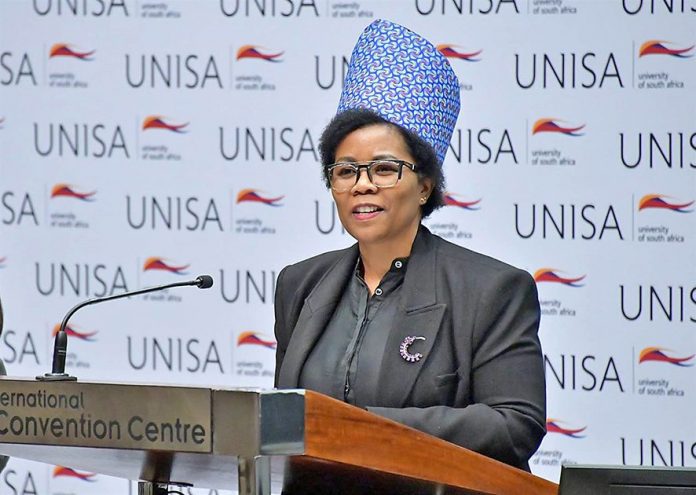For Professor Puleng LenkaBula, the euphoria of being the first at anything must be short-lived, but the resolve to do what is right, long-lasting.
LenkaBula, the first woman principal and vice-chancellor of the University of South Africa (Unisa), and the third black person to hold such a position in the institution’s 149-year history, joined it in January last year.
She was speaking to Sunday World days after the Minister of Higher Education, Science and Technology Blade Nzimande gazetted the appointment of Professor Themba Mosia as an independent assessor to investigate problems that have dogged the institution for almost half a decade.
LenkaBula said it was good to celebrate women; black people; people with disability or queer people who are the first to do things. “But if we don’t engage in the social analysis, then we may fall into the trap of the ‘euphoria of the first’. We should learn from our democracy that we don’t need to live with the euphoria for long,” she warned.
Using the metaphor of a glass ceiling, LenkaBula – one of only five women vice-chancellors in South Africa’s 26 universities – said: “The glasses from the glass ceiling can also wound us and deter us if we don’t have the resolve and commitment of our conscience that what we are doing has to be done,” she said.
“Sometimes when you do things that are beneficial for the majority, there are contestations,” she said. “I’m aware that when you rebuild an institution to be a centre of excellence — when you want the resourcing infrastructure of the university to align with the imperatives for improving the performance of the university and remove it from interests of just a few to the interest of structural change — that cannot be
easily taken.
“As a woman, I want young women … to know that it’s possible to be a vice-chancellor of a university whose resources are larger than some of the listed companies, and it’s very important to be a steward and custodian of its finances, resources and human capital in order that the future of the institution is not derailed but is protected.”
Mosia, the vice-principal for student life at the University of Pretoria, is tasked, among other things, with investigating the effectiveness of the university’s governance and management structures; the office of the registrar; the state of policies and procedures for
financial management, supply chain management, and procurement; and allegations of financial irregularities.
The former chairman of the Council for Higher Education will also look into the state of human resource policies and practices at Unisa from 2018. He has been given 90-days to advise the minister on measures required to restore good governance and management.
LenkaBula is being investigated for allegations of misconduct and mismanagement.
Amid the turbulence, LenkaBula is buoyed by the academic programme, which she said had not been disrupted, with Unisa improving its rating by the prestigious Academic Ranking of World Universities, also known as the ShanghaiRanking, released last month.
“Their analysis of our performance positioning us at number eight when we were number 12, tells me there’s a lot of ground covered in a very short time,” she said.
She said as Unisa prepares to mark 150 years, she would like it to also celebrate that they have heeded the call to put all hands on deck.
“I came to a university that had not complied with the enrolment management agreement with the department of higher education since 2014. Last year, we were at 99% of the enrolment, meaning we had complied with the enrolment as agreed,” she said.
“It is very important because if we don’t do so, the students who have to go to TVET [technical and vocational education and training] colleges or other universities cannot be financed, especially those who are supported by the National Student Financial Assistance Scheme. ”
About 400 000 students are enrolled at Unisa, with about a third of all South African students enrolled at the institution.
“I found 139 000 certificates … not delivered to students. By the end of the year [2021], we were left with 10 700,” she said.
“I also found this university with reserves of R6bn and this year when we sat for the second sitting of council, we had generated R13.6bn.
“The world must know that we doubled those reserves in one year just because we created a diversification system … these are the resources that are invested to nurture the academic programme and to make it relevant to change society for the better,” she said.
“We just had graduations where 42 000 plus students graduated,” she said, adding that Unisa produces the largest number of master’s and doctoral graduates.
“I’ve said to these doctoral graduates … we would like you to partner with us as our alumni to co-construct and strengthen the supervisory
capacity for master’s and doctoral degrees. This has not been done in the model that we are creating because for us to succeed we should be attentive to the aspirations of our society and of the National Development Plan, but also of the African Union,” she said.
Talking about the future of the university and its long history of being a pioneer of open distance learning, she said: “In the aftermath of Covid-19, are we still relevant because even industries are now bridging the distance … universities are wanting to use this modality? Is there something that we can start in 2022 or 2023 that celebrates the moments of democratic South Africa and its imagination in transporting the best from Africa? Yes, that is our dream,” she said.
For the latest entertainment news from Sunday World, click here.
Or read the latest from Shwashwi here.
Follow @SundayWorldZA on Twitter and @sundayworldza on Instagram, or like our Facebook Page, Sunday World, by clicking here for the latest breaking news in South Africa. To Subscribe to Sunday World, click here




